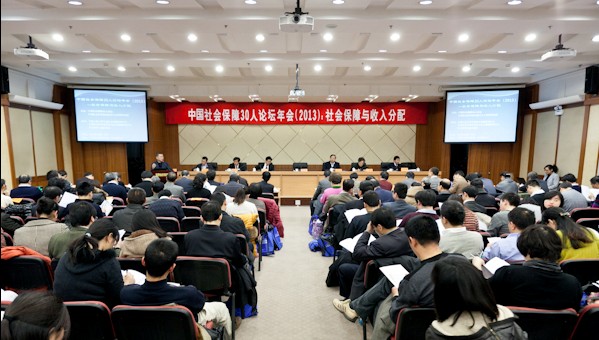Redistribution of social wealth calls for influx of positive energy
30-Person Annual Forum on China’s Social Security (2013) held in Beijing,China

The 30-Person Annual Forum on China's Social Security (2013) convened in Beijing
On February 22nd to 23rd, the 30-Person Annual Forum on China’s Social Security (2013) convened in Beijing to discuss the theme of social security and income distribution. Participants mainly addressed the function of social security in adjusting income distribution and how to optimize the social security system in China. The meeting is sponsored by the Forum and the Institute of Ethnology and Anthropology at the Chinese Academy of Social Sciences (CASS).
Li Yang, a member of the Party group and vice president of CASS, Chen Chuanshu, a member of the Party group of the Ministry of Civil Affairs and secretary of the Party group and executive deputy director of the China National Committee on Ageing, Wang Dongjin, president of the China Health Insurance Research Association, and Wang Jianlun, president of the China Social Insurance Association attended this conference.
In the opening speech, Li Yang noted the proposal of several new requirements for welfare raised in the Central Economic Working Conference last December, which iterated that welfare should ensure people’s ability to meet the minimum subsistence level, create employment, and perfect the pension system. Furthermore, the ideal of a hard-working, rich life should be promoted so as to encourage both the livelihood of the people and further the work of the party.
Social security plays an increasingly significant role in social wealth distribution
Shen Shuguang, a professor at the School of Government at Sun Yat-sen University, said that ”in recent years, China’s economy and social development have entered into a new stage, and protecting and improving people’s livelihood will be the new theme. How to guarantee that people share the achievements of development and that we realize collective prosperity have become today’s significant research subjects. ”
”The first step for mitigating the income gap is to achieve more equitable primary distribution and redistribution,” Wang Yanzhong, director of the Institute of Ethnology and Anthropology at CASS and director of Research Center for Labor and Social Security at CASS, emphasized “empirical research data shows that tax revenue and social security are the most important institutional mechanisms of redistribution. In many countries, the function of social security in adjusting income distribution has already surpassed that of tax revenue. The expenditure in social security for some industrialized countries takes up 1/5 or even 1/3 of their GDP, and accounts for 1/3 or even 1/2 of government expenditure,” Wang Yanzhong elaborated.
Rational approaches to the function of social security
Some scholars have conducted studies which conclude that there is a point at which an unreasonable and overly complicated social security system may have a negative influence on adjusting income gap, resulting in the income game actually expanding. Song Bao’an, a professor at the School of Philosophy and Society at Jilin University, said "the differences between social security coverage in different regions and industries and for groups are significant in contemporary China. Without eliminating these differences, social security’s positive effects will be weakened.”
Zheng Gongcheng, secretary-general of the 30-Person Annual Forum on China’s Social Security (2013) and a professor at the School of Labor and Human Resources at Renmin University of China, said that the current social security system in China faces many difficulties. For instance, the responsibility of sharing mechanisms need to be rebuilt, the structure of group interests needs to be adjusted, reforms in supervision and regulatory system have yet to be put in place and China’s current regional disparities and high population mobility are not issues that can be changed in the short term. Within every social security system, there are drawbacks, Zheng explained, insisting that “social security needs to be the fundamental guarantee of the fair distribution of wealth.” He believes that the basic step toward this goal is to optimize institutional arrangements.
China’s social security system is entering a steady progression
Still, Zheng is ultimately optimistic about the future development of the social security system in China, telling reporters that "the series of achievements in China’s construction of social security that were realized last year have demonstrated that China’s social security is entering a steady progression and is about to benefit all Chinese in the near future.”
More than 150 experts and scholars in social security from 50 universities and research institutes and related division principals from the Central Government attended the forum. At the forum, the Green Book of China Social Security System (2012), edited by Wang Yanzhong and organized by the Research Center for Labor and Social Security at CASS was released, along with the Investigation on Redistribution of Income of China Social Security System, a significant investigation into national affairs by CASS.
The Chinese version appeared in Chinese Social Sciences Today, No. 421. March.1, 2013
Translated by Zhang Mengying
